- Home
- Joy Dettman
The Tying of Threads Page 2
The Tying of Threads Read online
Page 2
They’d left their own air conditioner on, and she made a beeline for the sitting room, their only cool room. They would have required half a dozen air conditioners to cool the entire house.
There were six bedrooms in Vern Hooper’s old house, and since Trudy had been away at school, all bar one of those bedrooms were rarely used. They had two sitting rooms, the smaller of the two home to an ironing board and bookshelves.
They’d furnished the dining room, a beautiful room, though they rarely ate in there. Jim’s typewriter lived on the dining room table. The east-side front room, once Lorna Hooper’s library, had become Jenny’s sewing room, complete with a large cutting table and two machines.
It was a changed house since the days of Vern Hooper, internally changed. His kitchen, a good-sized room at the west-side rear of the house, had been gutted in the sixties to become a functional kitchen. They’d installed a combustion stove. It was their best room in winter.
They lived in the sitting room come summer, and Jenny fetched writing pad and biro, closed the sitting room doors then, the air conditioner rumbling as it churned out cool air, she sat down to write her letter.
Dear Florence and Clarrie,
We have organised Raelene’s funeral for eight thirty on Thursday morning. Ray’s insurance account will pay for it, so please don’t offer. We’ve booked a double room for you at the hotel for Wednesday night. If you decide against making the trip down, please cancel it. The phone number is above.
There will be no church service. Given the horrific circumstances of her death, we felt that a graveside service was more fitting. The undertaker’s phone number is also above, should you wish to alter any of our arrangements.
Sincerely,
Jen and Jim Hooper
Six o’clock, Jenny tossing a quick salad together for dinner when she lifted her head to the sound of thunder, a distant rumble.
‘The sky is very dark to the west,’ Jim said.
‘Smoke,’ Jenny said.
‘Smoke doesn’t rumble, Jen.’
‘I’ve lost my belief in rain,’ she said.
By seven, the thunder was close, and the sky to the west was a fireworks display of forked lightning.
From a western veranda they watched it come, a grey swathe of it, moving fast towards town.
‘It looks like one of those tornadoes they have in America,’ Jenny said.
Then it hit, just on nightfall.
Heavy rain on a tin roof is deafening. No rain in this storm. Chunks of ice the size of golf balls thrashed Woody Creek and the noise was horrendous. Voices unable to compete, Jim pointed at their car, a twenty year old two-toned green Ford, dented beyond repair by Raelene when she’d done what she’d deemed necessary to take possession of it. It would wear more dents tomorrow.
Then as fast as it began, the hail was gone and the rain came, wind-blown waves of rain, sheets of it, and the veranda guttering, leaf and hail filled, overflowed and Jen and Jim stood behind their own Niagara Falls.
LILA
Six nights a week, the Melbourne bus passed through Woody Creek. It was due in at around seven thirty, never early, but rarely more than twenty minutes late. It was late that night. Eight twenty-five when it drove into a town awash with water. Woody Creek’s gutters hadn’t been built to handle heavy rain.
Blunt’s Road was a lake fed by a river of run-off from the tiled roofs of a bunch of brand new houses, built on land once known as O’Brien’s acre. South Street’s bitumen crown was visible, and the bus clung to what was visible.
It stopped out front of the post office where one passenger stepped down into water – as did the driver. He opened his luggage bay to haul out a large and well-worn case, and with no passenger waiting in the rain to take possession of it, he sloshed through the water to place the case beneath the shelter of the post office’s veranda, where its owner had taken cover.
She wasn’t dressed for the weather. She’d clad herself that morning in a lolly-pink frock more suitable for the bedroom.
‘Trust this bloody town to turn on a flood for me,’ Lila Jones/Roberts/Freeman said, then added, ‘Ta.’
She’d lived in this godforsaken hole for a few years when she’d been married to her second husband, and every time she’d boarded the bus out since, she’d vowed never to set foot in the place again. Wouldn’t have been here tonight if she hadn’t been stony motherless broke.
She’d spent the best part of forty years stony motherless broke. Pregnant and disowned by her parents at fifteen, a wife and mother of twins at sixteen, she’d dumped them with her mother-in-law and moved to Sydney where she’d got work at a clothing factory. Got paid on Friday, been broke by Sunday.
Jenny Hooper had worked there. She’d always had money in her purse, smokes in her handbag and an extra sandwich in her lunch bag. She’d shared. Just a pair of kids with kids in ’43, their blokes away fighting a war.
A lot of water had run under the bridge since 1943. Jenny’s bloke had been rich and Lila’s hadn’t. Jenny had stayed put. Lila hadn’t. She’d crawled in and out of a lot of beds since the forties. Sex is known to be good exercise. Her figure had altered a little, but her hairstyle hadn’t, nor her spendthrift habits. Penny-pinching was for pensioners. Age was for others, and if a cruel mirror did at times attempt to point out her wrinkles, she turned her back on it.
From a distance, if sighted from the rear, Lila Jones/Roberts/Freeman could still draw the eye of males. Up close, with her long, dead, flat black hair, her face turned to leather by years of pursuing a good suntan, the males who didn’t run when she turned around were becoming few.
She was staring at the river of water flooding down the gutters and wishing that Jenny’s bloke owned a house in Melbourne when the lights went out and Woody Creek became a flooded black hole in hell.
‘Bloody hell to it,’ Lila said, turning to where the driver had placed her case. Her life was in that case.
*
Woody Creek’s powerlines had a bad habit of coming down in a storm. Too many trees, too many miles of aging posts and wires that sagged too low. Candles were kept in handy places, as were the old kerosene lamps and lanterns. They came out that night, and within moments of the blackout, that old yellow light glowed again from windows.
The air conditioners died. The televisions died, and with nothing to watch, and cooler outside than in, Woody Creek residents moved their chairs out to verandas to watch their gardens lap up the rain, a more gentle rain now that the storm had moved on.
Jen and Jim were sitting on the veranda when they heard the small gate squeal open. Jenny reached for the torch at her feet and turned its beam towards the bricked path that led to their front steps. Its beam exposed a saturated rag mop of a woman – and her case.
‘No,’ Jenny said. ‘Please God, not tonight.’
‘Lovely weather for ducks,’ Lila greeted them, and without a word, Jim claimed the torch and went indoors, leaving Jenny to greet her visitor in the dark.
The last time they’d given Lila a bed, they hadn’t been able to move her out of it for a month, and these days, one hour of her was too much. They’d ended up buying her a bus ticket and writing her a cheque for fifty dollars, and as the bus had pulled away, they’d sworn there’d be no next time. But what can you do when a drowned rat seeks the shelter of your veranda, and you don’t have the heart to hit it with a shovel?
You can lie. Jenny worked on a lie while fetching towels.
‘We’re leaving for Melbourne at dawn,’ she said. ‘We would have gone this afternoon if not for the storm. Trudy starts her nurse’s training next week.’ Or she’d start at the end of the month, and they had been planning a trip, though not until after they’d picked up their new car. The Ford, used by Raelene as a battering ram, might not make the distance, and its boot refused to stay shut unless it was roped down, but whether it got them further than Willama or not, they were leaving at dawn. Lila had an innate ability to alter Jenny’s plans.
�
��I’ll caretake your house for you while you’re away,’ Lila said.
‘Jim prefers to lock up,’ Jenny said. ‘I’ll drive you around to the hotel for the night.’
‘If I could afford to pay for a hotel, I wouldn’t be up here, would I? The Salvos lent me the fare, and I haven’t eaten anything since they fed me breakfast – and I’m going to wee myself in a minute.’
What can you do?
Jim, who’d lit a lamp and found a second torch, returned Jenny’s and, its beam lighting the way, she led Lila down to the rear bathroom, unchanged since the days of Vern Hooper, but good enough for an unwanted visitor.
She made a ham and pickle sandwich and, with still no sign of Lila, lit the stove. For five days it hadn’t burnt, but if they wanted a cup of tea tonight, the stove was the only way they’d get it. It also heated their hot water service and, familiar with Lila’s half-hour showers, Jenny knew that what little warm water remained in the reservoir wouldn’t be warm by the time Lila was done with it tonight.
‘We swore, Jen,’ Jim said.
‘We’re leaving for Melbourne at dawn. I’ll feed her then drive her around to the hotel.’
It was ten o’clock before they offloaded her, Lila clutching a ten-dollar note. Mrs Bowen, the publican’s wife, accepted a cheque for two nights’ accommodation and an envelope containing another ten dollars to buy Lila a ticket out of town. The Bowens knew her. Everyone in town knew the habits of Lila Jones/Roberts/Freeman.
Jenny did most of the long-distance driving, and in recent years had driven often enough to the city to know the back route through Seymour and Lilydale to Ringwood where Nobby and Rosemary, good friends, always had single beds available. Nobby and Jim had been together through the first three years of the war. Nobby marched each year in the Anzac Day parade, he went to RSL functions. Jim denied the war and his involvement in it.
They couldn’t deny Lila. When Jenny phoned the hotel on Wednesday morning, Mrs Bowen told her that Lila Freeman was no longer a guest. She was on the payroll.
Trudy wanted to go down to Frankston. She’d been at Templestowe with her friend Sophie and her family since the school year had ended because Jim, determined to keep her away from Woody Creek until the media’s cameras lost interest, had told her not to come home for Christmas. Now, with Lila in town, Trudy was still better off out of it. They moved down to Frankston to Vroni Andrews’ guesthouse.
They didn’t go to Raelene’s funeral. It wasn’t much of a funeral. A few brief words spoken at the graveside. Clarrie Keating had flown down alone from Queensland and would fly home that afternoon. Maisy, who attended most funerals, stayed in bed. Raelene had set the fire that killed Margot.
Jenny walked a near deserted beach, forcing herself to remember the little Raelie, who had loved the beach, who, if Florence and Clarrie had stayed out of her life, would have been different. If Florence hadn’t got pregnant . . . if Jim hadn’t come back into Jenny’s life.
‘Life is what it is, darlin’, and there’s only one way to walk it,’ Granny used to say, so that morning Jenny walked forward, walked forward for an hour until the funeral was well over, when she turned around and walked back.
In all, they spent ten days in Frankston. They saw Trudy and Sophie in their new uniforms, took too many photographs then left for the long drive to Willama, where they picked up their new car, a white Kingswood Holden, ordered the day Georgie disappeared, which, if not for Lila, they would have been driving a week ago.
Jim, a dyed in the wool Ford man, had been guided by Teddy Hall to the automatic Holden. With no clutch, it required only one foot to drive it. The war had stolen half of Jim’s left leg. He could drive a manual, but not confidently. The Ford had been Jenny’s car, her first and only car, and, battered or not, the final emptying of its glove box hurt, as did handing over the keys to the salesman.
Jim drove the Kingswood the last fifty kilometres home, and before they were out on the open road, he was in love with it.
The scent of its brand new upholstery was stifling. They wound the windows down, then smelled the heated motor, distrustful yet of its brand newness. It offered a more comfortable ride. There was good support in its bucket seats. The radio worked. For the last fifty kilometres home, their conversation was the car. Lila didn’t get a mention.
They parked it in the shed, its white paintwork too perfect to leave out of doors. They unloaded their luggage and many supermarket bags then walked around their new acquisition, admiring its lines.
‘You like it,’ she said.
‘I can drive it,’ he said.
The back fence of the hotel was only a narrow street away from their rose hedge; their kitchen chimney must have sent up smoke signals. She arrived, and before the supermarket bags were unpacked, she crept up on them and let herself in via the back door.
‘I didn’t think you were ever coming home,’ she said, then told them how the fates had conspired against them. ‘The hotel cook slipped on wet tiles when she ran out to pick up hailstones. Her wrist’s broken. I’m cooking for the next few weeks.’
Lila Jones/Roberts/Freeman knew how to cook for a crowd. At various times in her colourful life, between her variety of husbands and men friends, she’d cooked at cafés, for shearers, at roadhouses and at hotels. With the caravan park booked out during the school holiday season and Freddy Bowen’s hotel the only place in town to buy a meal, he couldn’t afford to be without a cook.
‘Free accommodation, he said, and he sticks me in one of their sleep-outs behind the pub with old Shaky Lewis next door,’ Lila said. Shaky was the hotel’s resident alcoholic handyman.
‘Beggars can’t afford to be choosy,’ Jenny said.
Jim went to bed early to escape her and, at eleven, Jenny walked her across the narrow street.
A too narrow street. She returned, morning, afternoon and evening. She stayed for an hour, or six. Breakfast, lunch and dinner were served at the hotel on Thursdays, Fridays and Saturdays, but only breakfast from Sunday to Wednesday, giving Lila four days and four nights free to spend in Jenny’s kitchen – until a delegation of town councillors came by to discuss Georgie’s grocery shop, its twin green doors locked since she’d left town.
Robert Fulton owned the hardware store on the corner of South Street and Blunt’s Road. Joss Palmer, married to Jessica Macdonald, was Macdonald’s mill foreman. Dave Watson, an elderly farmer, had a son, Walter, who’d married Emma Fulton, Robert’s sister. He opened the conversation.
‘It’s about your girl’s shop,’ he said.
Emma had seen Georgie drive away, had seen the twin green doors of her shop left open. Until the fire, Emma had worked part time for Georgie, and that day she’d closed the doors and fitted the padlock, which had been in place since.
‘Is she planning to sell?’ Dave asked.
‘We haven’t heard from her,’ Jenny said.
‘The town needs that shop,’ Joss Palmer said. ‘Jessica and her mother have been doing a run down to Willama three or four times a week, shopping for those who can’t get down there. If she’s not going to open it, it needs to be sold, Jenny.’
‘She’s not here to sell it, and we can’t,’ Jenny said.
‘If you’re prepared to take responsibility for it, Emma said she’d be willing to help out behind the counter,’ Robert said.
THE DOUBLE DARE
Macka and Bernie Macdonald, joined at the elbow since they’d slid from the womb, spent most nights elbow to elbow at the hotel’s bar. They liked watching Lila, who dressed like a woman but drank like a male, drank in the bar like a male where she told bluer jokes than a male, and laughed louder.
She spent little time looking their way. She liked her men younger and better looking. By their fifty-eighth year, Maisy’s twins were no-necked, thick-shouldered, broad-chested, pot-bellied, bald-headed old men.
Five days a week they worked side by side at their sawmill, willed jointly to them by George, their father. Seven nights a week they shared a twi
n room in their mother’s house. Maisy fed them; she did their laundry, made their beds, told them what to do and when to do it. On occasion they did it.
She’d told them tonight that one of them would be driving her and Dawn down to the city next Wednesday to see a quack, then told them to make up their minds which one of them was doing it.
Neither twin had become accustomed to a regular supply of sex. What little they got they paid for in Melbourne, and the one who did the driving would have access to a place they knew in Fitzroy, which was what may have got them eyeing off Lila. According to pub rumour, she was a contortionist in bed. The male animal, when segregated in a bar room, has always been prone to exaggeration when it comes to discussions of sexual conquests.
‘Ask her what she charges,’ Macka said.
‘Go to buggery,’ Bernie said.
‘I dare you!’
‘I double dare you, you ugly bastard,’ Bernie said.
Neither one took the dare. They had another beer instead, listened to another joke, bluer than the last, then went home for a late dinner.
Dawn was still off her food, and the only member of the family who couldn’t afford to go off her food; there wasn’t an ounce of fat on her. Maisy was worried about her; Bernie and Macka weren’t the worrying kind.
‘Whoever is driving us will be driving my car,’ Maisy said.
‘Drive yourself then,’ Macka said.
‘I’m too old to battle my way through Melbourne traffic.’
‘You’re too bloody slow to,’ Bernie said.
The twins had a separation complex as kids; Maisy’s means of controlling them had been to lock them in separate rooms, or deliver one out to their older sister Patricia’s farm – and take his boots so he couldn’t walk home. If their father had backed her up, she might have got control of those boys. He hadn’t, so she hadn’t.
They each drove a ute, a black Holden ute, and those twin utes were a town joke. The last time they’d updated them, Dawn told them they were a joke, not that Macka and Bernie gave a bugger about what anyone said, unless it was said to their faces, and when it was, few said it a second time. The twins fought as one, always had.

 The Hope Flower
The Hope Flower Trails in the Dust
Trails in the Dust Diamonds in the Mud and Other Stories
Diamonds in the Mud and Other Stories Moth to the Flame
Moth to the Flame The Tying of Threads
The Tying of Threads Wind in the Wires
Wind in the Wires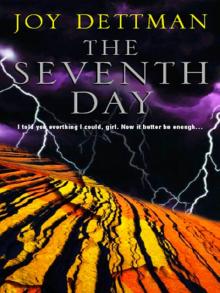 The Seventh Day
The Seventh Day Thorn on the Rose
Thorn on the Rose Jacaranda Blue
Jacaranda Blue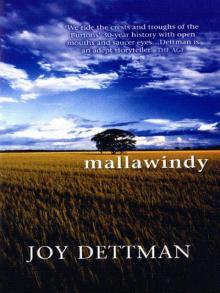 Mallawindy
Mallawindy Ripples on a Pond
Ripples on a Pond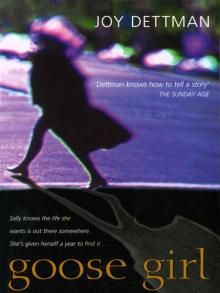 Goose Girl
Goose Girl The Silent Inheritance
The Silent Inheritance Henry’s Daughter
Henry’s Daughter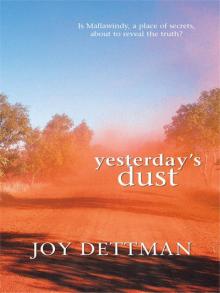 Yesterday's Dust
Yesterday's Dust Pearl in a Cage
Pearl in a Cage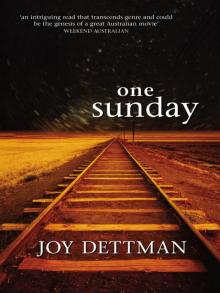 One Sunday
One Sunday